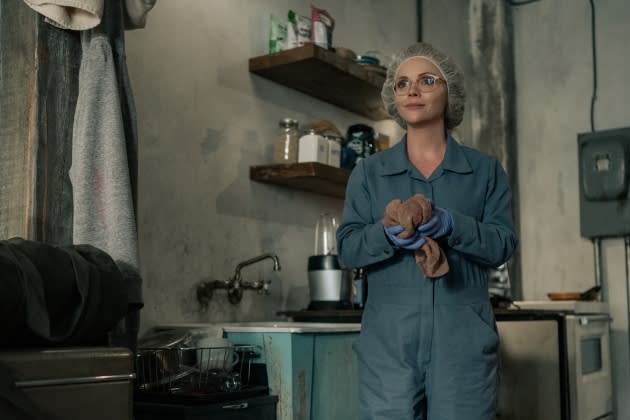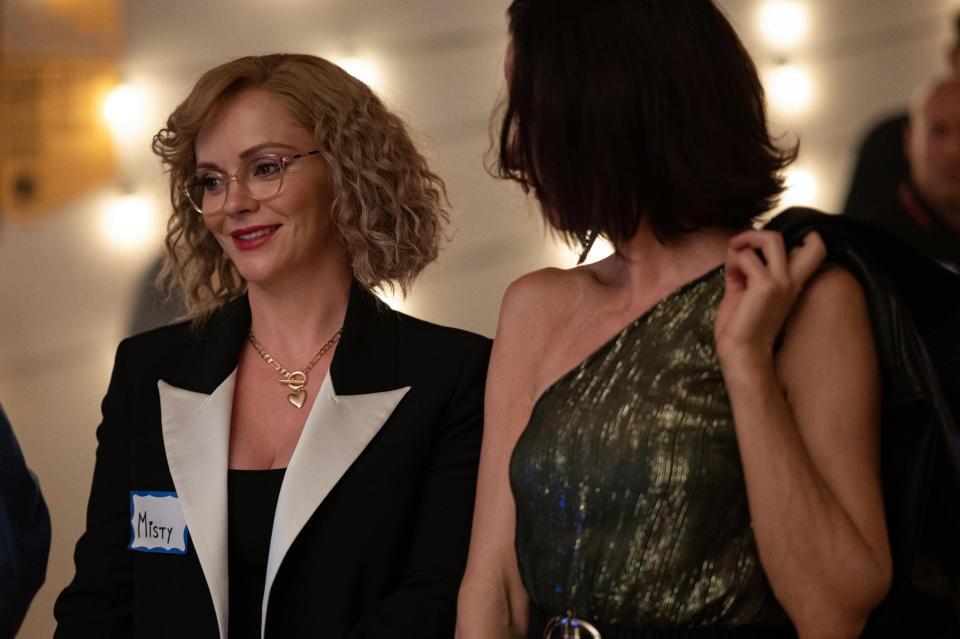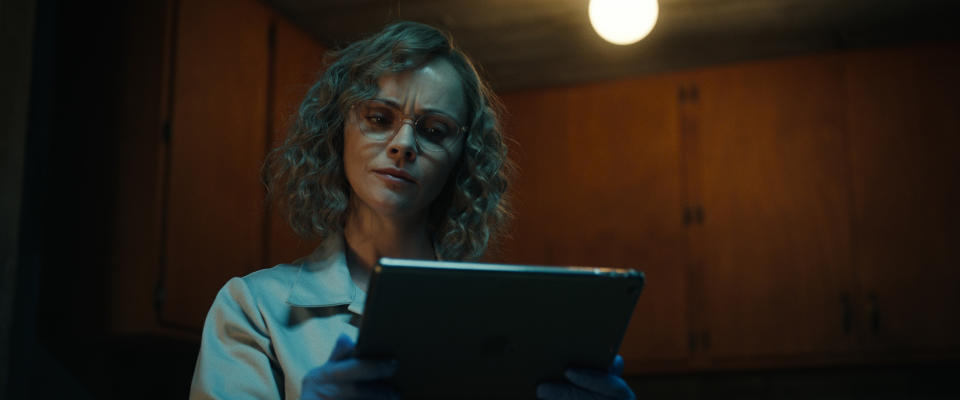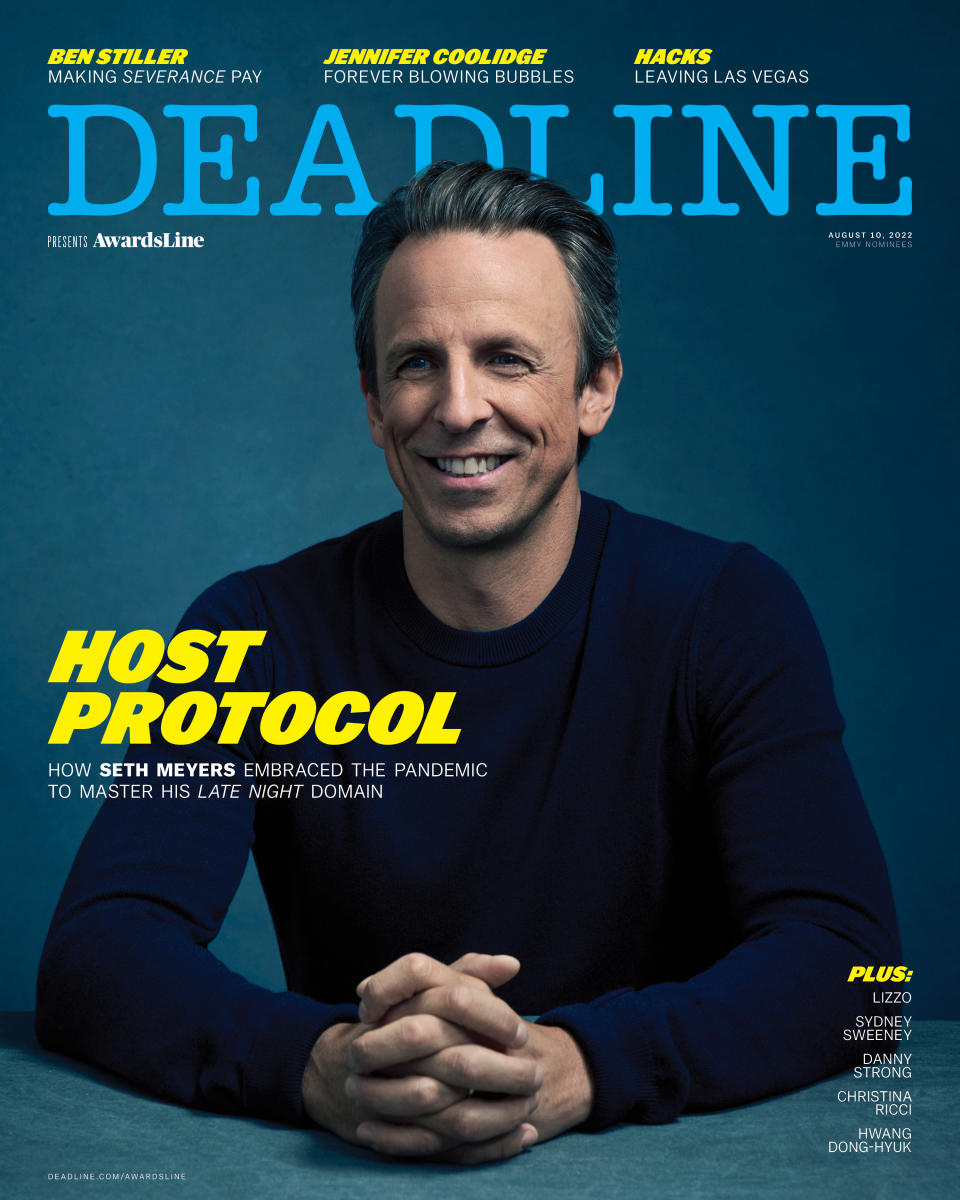‘Yellowjackets’ Christina Ricci On Why She Roots For The Underdog — Even If It Bites Her
- Oops!Something went wrong.Please try again later.

At 15, Christina Ricci appeared in a PG-13 comedy called Now and Then, in which four middle-aged best friends meet up to reflect on their teenage selves. Nearly 30 years later, Showtime’s Yellowjackets is that film’s hard-R evil twin, in which the fortysomething members of a New Jersey school’s female football team are haunted by memories of a traumatic plane crash that left them stranded when they were kids. It’s hard to pick a single performance from a terrific ensemble, but Ricci’s portrayal of the twisted Misty Quigley, played in flashback by Sammi Hanratty, is a standout in a series that shocks and surprises.
DEADLINE: Why did you want to want to do Yellowjackets?
More from Deadline
Showtime Pausing 'The Chi' & 'City On A Hill' For A Week To Air 'Jackass Forever'
Lauren Ambrose Joins Showtime's 'Yellowjackets' In Series Regular Role
CHRISTINA RICCI: I loved the idea of it — the premise in general. But then I read the pilot script and the only scene I had in the whole episode was such an incredibly well written, succinct, informative, evocative scene. It was about a character type I’ve always been fascinated by — petty, small people who are so powerless in the world that their only way to fight back is through these tiny little instances of being able to force their will onto someone else. I’ve always been fascinated by that character type, and I was excited, because I really, really, really enjoy playing characters that do bad things. Then I was told that, later on in the show — if we were picked up — Misty would do some pretty terrible criminal things, and I was completely intrigued. I’m referring more to the murder she commits [laughs]. Kidnapping, torture, that kind of stuff!
DEADLINE: The show is unusual in that its weaving of the past and present gives both time frames equal weight. Did you always know that would be the case?
RICCI: I knew after the pilot and I loved that as well, because it’s so helpful for my performance. Frankly, it allows me to start from a further along place then I would if I was the only person playing the character — it’s a real luxury to not have to worry about showing the past. Especially with Misty. She’s such a proactive character: she just goes, goes, goes. The past doesn’t really seem to have had much effect on her. Obviously, it’s shaped her and formed her, but, intellectually, I don’t think she ever looks back.
DEADLINE: What does a typical script look like? Do you get the whole episode or just your timeline?
RICCI: We read the whole script and we have a Zoom table read, or at least we did last year. Actually, seeing what happens in the flashback scenes is very important, because a lot of times in the script there’ll be scenes that mirror things that happen in the past. So, I learned to look out for those things, to make sure that I could do them the way that Sammi did, or make sure Sammi did it the same way that I do it in the present.
DEADLINE: How much interaction did you have with Sammi?
RICCI: We didn’t have that much interaction before the pilot — we met very briefly. And then when we finally went to shoot the season, we had a lunch and discussed the character. Obviously, neither of us are doctors, so in terms of diagnosing Misty, it’s a little more complicated. But with a character that is so extreme, you do have to have a specific take on her, and rules for her, because she’s still a person.

Kailey Schwerman/SHOWTIME
DEADLINE: How much research can you do into a character like Misty?
RICCI: You can’t do any, really, because when you’re doing TV, it’s not set in stone what this character will be doing. You have to have a concept that can evolve and stretch, but you also, as an actor, have to feel confident that you know your parameters. They intentionally put a scene in there when Misty’s a child, where she stares at an animal drowning and dying. To me, that speaks to a lack of empathy, and, as a sort of dime-store psychiatrist, I’d think that they were saying that she’s a bit of a sociopath. From there, what I do is just try to take everything I see written for her and really ground it in reality. And also, with such an extreme character, you never want her to be purely comic relief. I was always like, “I just don’t want her to be a clown. She can’t be the clown.”
DEADLINE: But she’s still very funny and in a very elevated, witty way.
RICCI: Well, I don’t think she’s stupid. She’s learned a lot of coping mechanisms, survival skills, methods of getting ahead, manipulative tactics that involve pretending to be as innocuous as possible. I always describe her as a murderous golden retriever. [Laughs] It’s how I describe myself, actually. Inside she’s seething, but she has to cover it all the time with this very innocuous, adorable kind of thing. But that means that her main form of hostility is passive aggression, and usually through the things she says and the things she does, you can tell she’s actually very smart and understands everything that’s going on, even if somehow, she just cannot do the right thing.
DEADLINE: It’s so nice to see good parts for women. There’s you, Melanie Lynskey, Juliette Lewis, Tawny Cypress… And you’re playing great characters, with not too many men to clutter the horizon.
RICCI: You’re right. I mean, all the parts on this show are just some of the best examples of characters for women right now, because they are so specific and unique and individual and not just types. That’s something I think that is only now starting to be the norm — that we don’t treat women as tropes or props, and they don’t have to be specific types that we recognize. It’s very strange now. If you read a script or you see a show where women are treated in that way, it’s so glaring. It’s like, “Ooh, that feels dated.”
DEADLINE: How much have you seen the industry change since you started acting?
RICCI: For me? Well, when I started, I was a child and just happy to be in that environment and away from home and working. It was exciting and fun, so all I focused on was being really well behaved so that I would get more jobs. But now that I’m past my difficult 20s, and all of the distraction that goes on in that time, I feel like I can really look at my work from a creative, artistic, intellectual standpoint, with all the calm that comes with age. It’s really lovely for that to be what I drown myself in and focus on, and it allows me to shut out all the other kind of stuff about being an actress that is superfluous.
DEADLINE: How did you find the transition from child acting to adult acting?
RICCI: Actually, I didn’t have a hard time, because, just as I became 17, independent film became a huge thing and for the first time, filmmakers wanted to cast actual teenagers to play teenagers. The kind of material was so meaty and gritty. That really helped me to not struggle in my transition to doing adult films — but, again, it’s just a time-and-place kind of thing. I got really lucky.
DEADLINE: Did casting agents have preconceptions of you?
RICCI: At that time, I did a lot of indies because, in mainstream movies, there was still a lot of leading-lady standards that I didn’t fall into.
DEADLINE: You’ve certainly seen that change.
RICCI: Well, yeah. But I’m not at that age anymore. I’m not in my 20s and it’s not the 2000s, when you were either a leading lady or a character actress, and there was no in-between. Now they’re melding and blending. I’m not sure what it’s like to be in your 20s now, as an actress. But I do think, from what I see as a TV- and film-watcher, that they’re also benefiting from playing much more complicated, interesting women.
DEADLINE: Tell me about your production company. How does that work?
RICCI: I spend a lot of my time mining for material, articles. One of the pieces I have is an obscure piece of true crime that I found. Another piece is an article from Vanity Fair about old Hollywood lore. I spend most of my time looking for IP and material and then trying to package it, find partners. And I’ve been successful with a few things.

Showtime
DEADLINE: What kinds of stories appeal to you?
RICCI: I usually look for something that’s a little bit different. I love a story; I love an antihero. I love it when the protagonist is just a scumbag, but you’ve got to follow them anyway and figure out why. And I like being challenging — I like the idea of the audience having that sort of emotional character arc experience. You know what I mean? I like turning the tables. I don’t know how to really eloquently describe it, but I like the idea of people seeing something that they think they couldn’t possibly relate to — but then being intrigued enough to want to understand it and follow along with it. I do not believe that audiences have to see themselves in a character to want to watch them and understand them, and that has been something I’ve argued about for my entire career.
DEADLINE: Where does that interest come from?
RICCI: I’ve always been like that. I’ve always been that person who stands too close to the abandoned dog and then gets bitten. I’ve always really over-empathized with, maybe, the wrong types of people, because I’m fascinated by deviant behavior. In a weird, Pollyanna-ish way I have that optimism of thinking that people are good deep inside, even when they’re really not.

DEADLINE: Which of your roles do you think has come closest to achieving what you’ve just been talking about?
RICCI: I don’t know how to answer that question, but I do feel that — in terms of putting something really off-putting in front of people and then ultimately making it compelling and interesting enough that they want to dive in and end up actually even liking the character — Misty is a very good example of that. I finally found the right job for it.
DEADLINE: What has the reaction to Yellowjackets been like? On a personal level, not just from reading it in the trades.
RICCI: People really like it. I mean, everyone I talk to loves it. I have friends who genuinely love it, and they aren’t just saying that because they’re my friends. I have a lot of trouble [processing success]. I’ve always been like that, since I was young and super-famous. I don’t feel famous — I’m just home, doing my day. It’s hard to actually feel this ephemeral thing, that somewhere out there, hanging above us, there’s a hit show and everyone’s crazy for it. I can’t feel that. But it is very, very exciting to be in the position I’m in now, and for the show to be so nominated and for people to really love it. Because it is a bit of a risk in a lot of ways, in the way it deals with women and their characters. And so if it had failed, or been stupid, that would’ve been really a shame for women.
Best of Deadline
'Better Call Saul' Characters' Fates Revealed In Series Finale - Photo Gallery
2022-23 Awards Season Calendar - Dates For The Oscars, Emmys, Grammys, Guilds, Festivals & More
Sign up for Deadline's Newsletter. For the latest news, follow us on Facebook, Twitter, and Instagram.

